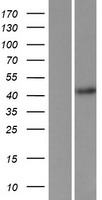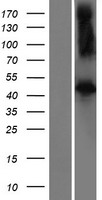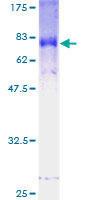order histories, retained contact details for faster checkout, review submissions, and special promotions.
Forgot password?
order histories, retained contact details for faster checkout, review submissions, and special promotions.
Locations
Orders Processing,
Shipping & Receiving,
Warehouse
2 Shaker Rd Suites
B001/B101
Shirley, MA 01464
Production Lab
Floor 6, Suite 620
20700 44th Avenue W
Lynnwood, WA 98036
Telephone Numbers
Tel: +1 (206) 374-1102
Fax: +1 (206) 577-4565
Contact Us
Additional Contact Details
order histories, retained contact details for faster checkout, review submissions, and special promotions.
Forgot password?
order histories, retained contact details for faster checkout, review submissions, and special promotions.
FBXL2
F-box and leucine-rich repeat protein 2
Calcium-activated substrate recognition component of the SCF (SKP1-cullin-F-box protein) E3 ubiquitin-protein ligase complex, SCF(FBXL2), which mediates the ubiquitination and subsequent proteasomal degradation of target proteins. Unlike many F-box proteins, FBXL2 does not seem to target phosphodegron within its substrates but rather calmodulin-binding motifs and is thereby antagonized by calmodulin. This is the case for the cyclins CCND2 and CCND3 which polyubiquitination and subsequent degradation are inhibited by calmodulin. Through CCND2 and CCND3 degradation may induce cell-cycle arrest in G0. SCF(FBXL2) may also mediate PIK3R2 ubiquitination and proteasomal degradation thereby regulating phosphatidylinositol 3-kinase signaling and indirectly autophagy (PubMed:22323446, PubMed:22020328, PubMed:23604317). PCYT1A monoubiquitination by SCF(FBXL2) and subsequent degradation may regulate synthesis of phosphatidylcholine, which is utilized for formation of membranes and of pulmonary surfactant.
| Gene Name: | F-box and leucine-rich repeat protein 2 |
| Family/Subfamily: | F-Box |
| Synonyms: | FBXL2, F-box/LRR-repeat protein 2, F-box protein FBL2/FBL3, FBL3, Fbl2 |
| Target Sequences: | NM_012157 |








If you do not find the reagent or information you require, please contact Customer.Support@LSBio.com to inquire about additional products in development.









